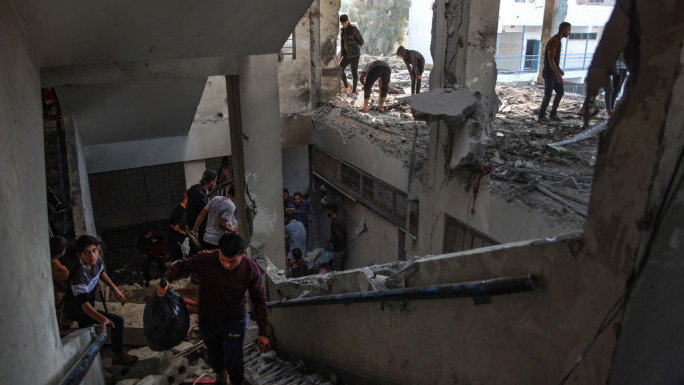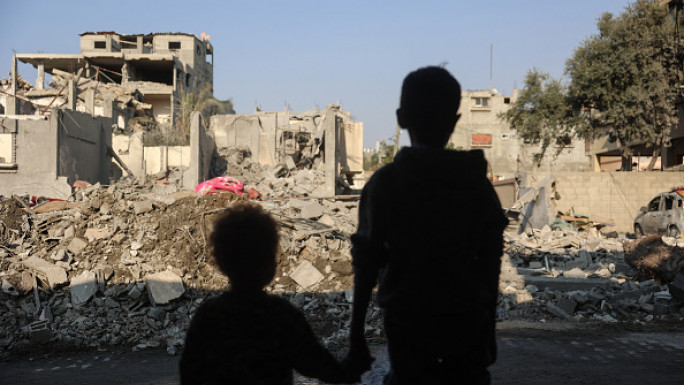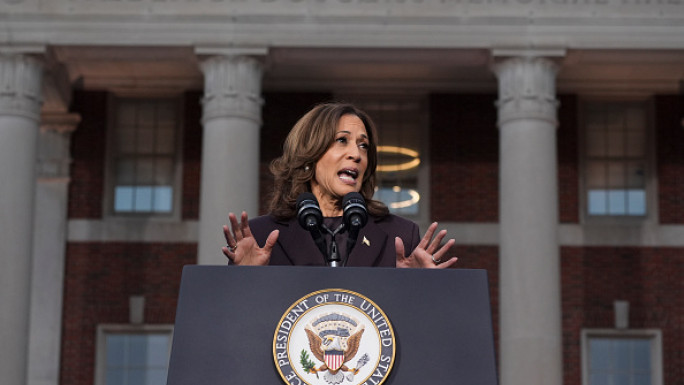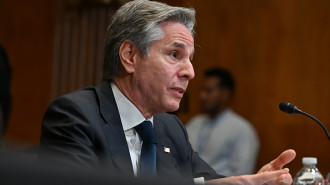UN demands Western Sahara mission be fully restored
UN demands Western Sahara mission be fully restored
The UN chief on Tuesday urged Morocco to reinstate the UN peacekeeping force and mission in Western Sahara, after the North African kingdom expelled the mission last month.
3 min read
Ban Ki-Moon says the expulsion of the UN peacekeeping force may aid extremists [AFP]
UN Secretary-General Ban Ki-moon warned Tuesday that Morocco's expulsion of staff from the UN mission in Western Sahara could be exploited by extremists and urged the Security Council to restore the peacekeeping force.
Ban said in a report obtained by AFP that staff cuts ordered by Rabat are weakening the MINURSO mission and "can be expected to be exploited by terrorist and radical elements."
"I call on the Security Council to restore and support the mandated role of MINURSO," said the report sent to the council on Monday.
"The risk of a rupture of the ceasefire and resumption of hostilities, with its attendant danger of escalation into full-scale war, will grow significantly in the event that MINURSO is forced to depart or finds itself unable to execute the mandate that the Security Council has set," he said.
Council members are to vote on April 28 on whether to renew the mandate of the mission, which was established in 1991 after a ceasefire ended a war that broke out when Morocco sent troops to the former Spanish territory in 1975.
Morocco expelled 83 civilian staffers of MINURSO a month ago and shut down a military liaison office, severely crippling operations in what was once a 500-strong mission.
The move was in response to a visit by Ban to the region during which he used the term "occupation" to refer to the status of Western Sahara, a term fiercely rejected by Rabat.
In his report, Ban said the mission should stay on for a further 12 months, until April 2017.
Ban's appeal to the Security Council put pressure on France, Senegal and Spain which have been in close contact with Morocco over the fate of MINURSO.
While the council has called for the mission to continue its work, it has been divided on the way forward.
The UN chief warned that downsizing MINURSO will have "significant implications for the stability of the region as well as the credibility of the Security Council and United Nations peacekeeping" worldwide.
Diplomats have raised concerns that concessions to Rabat will embolden other governments unhappy with a UN presence to try to weaken the missions.
Keeping MINURSO intact is "absolutely critical, not just for Western Sahara but also for UN peacekeeping broadly," said British Ambassador Matthew Rycroft.
"It's the Security Council that decides the mandate, it's the Security Council that decides whether to change it or not," he said.
Morocco maintains that Western Sahara, which it forcibly annexed in 1976, is an integral part of its kingdom despite a UN resolution that tasks MINURSO with organising a referendum on the future of the territory.
Sahrawis have long campaigned for the right to self-determination and the Sahrawi Arab Democratic Republic is a full member of the African Union.
Ban also requested that the council approve the deployment of 14 additional military medical personnel to a new MINURSO outpost in response to the cuts in personnel that have affected drivers and communications.
He said the time had come to engage in "serious negotiations" on a political solution to end the decades-old conflict.
Ban said in a report obtained by AFP that staff cuts ordered by Rabat are weakening the MINURSO mission and "can be expected to be exploited by terrorist and radical elements."
"I call on the Security Council to restore and support the mandated role of MINURSO," said the report sent to the council on Monday.
"The risk of a rupture of the ceasefire and resumption of hostilities, with its attendant danger of escalation into full-scale war, will grow significantly in the event that MINURSO is forced to depart or finds itself unable to execute the mandate that the Security Council has set," he said.
Council members are to vote on April 28 on whether to renew the mandate of the mission, which was established in 1991 after a ceasefire ended a war that broke out when Morocco sent troops to the former Spanish territory in 1975.
Morocco expelled 83 civilian staffers of MINURSO a month ago and shut down a military liaison office, severely crippling operations in what was once a 500-strong mission.
The move was in response to a visit by Ban to the region during which he used the term "occupation" to refer to the status of Western Sahara, a term fiercely rejected by Rabat.
 |
Morocco maintains that Western Sahara, which it forcibly annexed in 1976, is an integral part of its kingdom despite a UN resolution that tasks MINURSO with organising a referendum on the future of the territory. |  |
Ban's appeal to the Security Council put pressure on France, Senegal and Spain which have been in close contact with Morocco over the fate of MINURSO.
While the council has called for the mission to continue its work, it has been divided on the way forward.
The UN chief warned that downsizing MINURSO will have "significant implications for the stability of the region as well as the credibility of the Security Council and United Nations peacekeeping" worldwide.
Diplomats have raised concerns that concessions to Rabat will embolden other governments unhappy with a UN presence to try to weaken the missions.
Keeping MINURSO intact is "absolutely critical, not just for Western Sahara but also for UN peacekeeping broadly," said British Ambassador Matthew Rycroft.
"It's the Security Council that decides the mandate, it's the Security Council that decides whether to change it or not," he said.
Morocco maintains that Western Sahara, which it forcibly annexed in 1976, is an integral part of its kingdom despite a UN resolution that tasks MINURSO with organising a referendum on the future of the territory.
Sahrawis have long campaigned for the right to self-determination and the Sahrawi Arab Democratic Republic is a full member of the African Union.
Ban also requested that the council approve the deployment of 14 additional military medical personnel to a new MINURSO outpost in response to the cuts in personnel that have affected drivers and communications.
He said the time had come to engage in "serious negotiations" on a political solution to end the decades-old conflict.
![Ban Ki-moon visit to Western Sahara [AFP] Ban Ki-moon visit to Western Sahara [AFP]](/sites/default/files/styles/large_16_9/public/media/images/C07A5FAB-0F62-4346-A44C-CFC804C1CFC4.jpg?h=d1cb525d&itok=rlbACxi2)

![President Pezeshkian has denounced Israel's attacks on Lebanon [Getty]](/sites/default/files/styles/image_684x385/public/2173482924.jpeg?h=a5f2f23a&itok=q3evVtko)



 Follow the Middle East's top stories in English at The New Arab on Google News
Follow the Middle East's top stories in English at The New Arab on Google News

![Turkish police [Getty]](/sites/default/files/styles/image_330x185/public/2153417578.jpeg?h=a5f2f23a&itok=7vkscAmH)
![Netanyahu speaking at UNGA [Getty]](/sites/default/files/styles/image_330x185/public/2173933661.jpeg?h=7fa0b68e&itok=fYAD--EA)